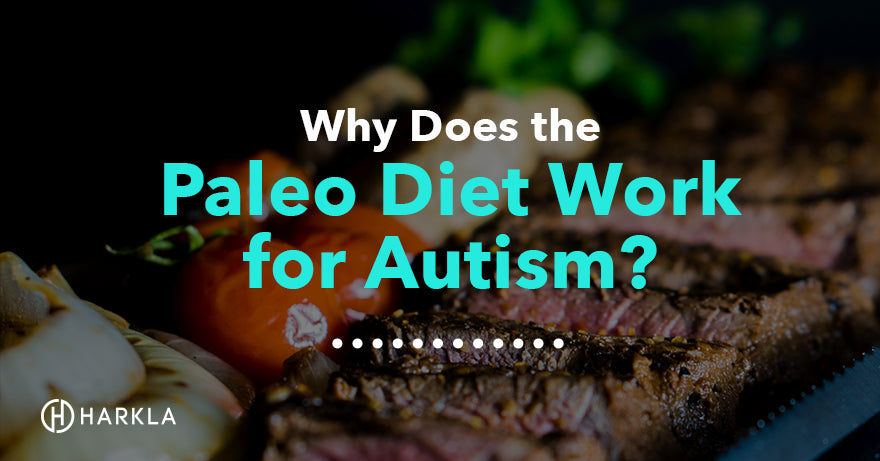Your Cart is Empty

Have you heard of the paleo diet? It has been gaining popularity over the last few years. If you are unfamiliar with it, don’t worry. We’ll go over it in detail below.
But first, I wanted to let you know that this article is part of a series of related articles about things you can do to improve your child’s autistic symptoms. They are a mixture of diet changes, supplements, and activities that are backed by science to help alleviate some of the symptoms that come with being on the spectrum.
If you’d like all these articles in a nicely designed, easy to read PDF, just click here and enter your email address and we’ll send you a copy!
The general idea of the paleo diet is that you eat what our paleolithic ancestors ate. This is where the name “paleo” comes from.
The theory behind the paleo diet is that because our first human ancestors appeared in Africa 1 to 2 million years ago, we went at least a million years eating mostly meat, fish, vegetables, and a little bit of fruit. This was all that was available to our ancestors before the agricultural revolution in 10,000 B.C. when we started to grow crops.
So the idea is that as we evolved slowly into the species we are today, we have spent much more time eating meat, fish, and veggies than we have eating crops like wheat and soy. In research on nutrition and neurological conditions, this has led to discussion of the paleo diet for autism as a possible way to reduce exposure to processed foods and support overall health.
Now even the wheat we are eating today is different than the wheat our ancestors were eating 10,000 years ago. With genetically modified foods and the use of chemicals in our farming, our farmed foods aren’t the same as they were.
Another aspect of the paleo diet is that we should only be eating organic foods, since our ancestors only had organic food. Eating organic is important for us because food that isn't organic and uses compounds like Roundup have been shown to change the gut microbiome in ways that contribute to autism, depression, cancer, and more.
Also, when it comes to meat, eggs and fish, you always want to go with organic, grass-fed, pasture-raised and wild-caught.
In the past articles we wrote, we looked at why improving your child’s gut bacteria can improve their autistic symptoms, why they could be extra sensitive to MSG, and how adding certain foods and supplements could improve their ability to remove toxins from their body.
Eating paleo forces you to avoid foods that hurt your gut bacteria, foods that contain MSG, and foods that support a healthy waste removal system. This is why some experts consider it part of an autism recovery diet, since the focus is on reducing triggers and supporting the body through clean, whole foods.
Paleo is like an all-encompassing diet to hit all three of those factors for improving your child’s autistic symptoms.
However, you could simply eat ground beef 100% of the time and be considered as "eating paleo". You want to make sure you don’t just eat a paleo diet and skip out on all the great protocols from the above-mentioned articles.
You can think of Paleo as the general outline and the above-mentioned protocols as details you need to fill in along the way. Doing this will give your child the best chance at improving their autistic symptoms.
The second reason I think paleo is a great option is that it's a whole diet that the entire family can do together. Since most people who switch to paleo see good results, there’s no reason for your entire family not to give it a go.
There’s actually a lot of science backing up switching to a paleo-like diet is good for most people, but since this article is specifically about why paleo is good for children with autism, I’ll stick to that. We do link to more resources below that can help.
If you do it as a whole family, your child won’t feel singled out, which will make it easier for them to follow. Also, if everyone is doing it, then you're forced to get rid of junk food and to stop buying it.
If you make your child eat paleo, but you get to eat junk food, they’ll be way more likely to sneak into the cupboard and eat your junk food, which will hurt them and impair their recovery.
Another reason I like paleo as an option as it gives you a direct reference to look for recipes. If you go to Amazon and search for paleo cookbooks, you’ll find a massive amount! On top of that if you are craving some food that isn’t paleo, you can simply Google “Paleo [food you are craving]” and you almost always find a recipe that pulls it off.
Some examples that I’ve made are:
You can start buying healthier ingredients and cooking delicious, healthy meals that won’t only make you healthier, but can have an enormous impact on your child.
Shifting to a new way of eating can feel overwhelming at first, but taking it step by step makes the process much easier. The paleo diet for autism doesn’t have to be all-or-nothing from day one - small, consistent changes can make a real difference over time.
Start with one meal. Try making breakfast or dinner paleo-friendly by focusing on meat, fish, vegetables, and healthy fats. Once that feels comfortable, expand to the rest of the day.
Swap out snacks. Replace packaged foods with simple options like fruit, nuts, or paleo-approved bars. These small changes cut down on processed ingredients without feeling restrictive.
Build it out gradually. After a week or two, aim to make most meals paleo-based. Some people find it helpful to prepare larger portions and use leftovers for quick lunches.
Track changes. Keep notes on energy, mood, sleep, or digestion. Paying attention to these areas can show whether the diet is having an impact and help guide adjustments.
Over time, the paleo diet can become a natural routine rather than a strict plan. The key is to focus on consistency, not perfection, and observe how your body responds along the way.
Below are some resources that you can check out to further understand the paleo diet and see what kind of recipes you can start cooking up!
Websites with Paleo Recipes:
Hi Denise,
We hope you’re able to share this article with them. In addition, there are many other super helpful articles that can provide a lot of resources and direction for them!
All the best,
Nicole
Harkla
My granddaughter was just diagnosed with autism. She also has aproxia of speech.
Trying to get my son and his wife to understand this can change her life.
Comments will be approved before showing up.



Danny Johnson
May 20, 2020
In addition to this diet, people can try the Nemechek Protocol. Good luco and God bless.